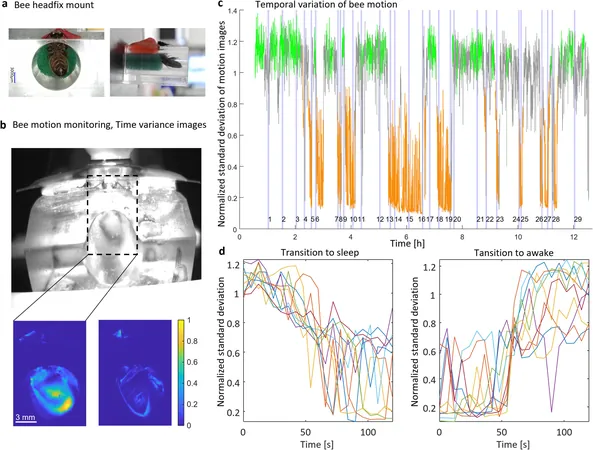
Unlocking the Secrets of Sleep: What Slumbering Bees Reveal About Human Sleep and Memory Disorders
2025-05-13
Author: Wei
Bees and Humans: Striking Similarities in Sleep Patterns
In a fascinating breakthrough, researchers at the University of Trento have discovered that the brain activity of sleeping bees mirrors processes seen in human sleep. This incredible finding suggests a deeper evolutionary link between these industrious pollinators and humans.
A Groundbreaking Study Unveiled
Published in the journal Neural Networks, the study titled "Neuronal correlates of sleep in honey bees" explores how the neuronal signatures of sleep in bees parallel those observed in mammals. Leading the research, Albrecht Haase and his expert team from the Center for Mind/Brain Sciences have used cutting-edge technology to pioneer this field of study.
Inside the Bee Brain: A Revolutionary Approach
This research marks the first time scientists have mapped what occurs in the brains of sleeping honey bees. Utilizing optical brain imaging, machine learning, and computational neural modeling, the team studied how sleep impacts sensory perception, especially in the antennal lobes—bees' primary centers for smell.
The Surprising Function of Sleep in Bees
During their nightly rest, bees exhibit synchronized brain activity, entering a state of reduced information processing akin to mammals. The study highlights that during sleep, bees experience a decrease in olfactory perception, which is essential for their survival and navigation.
Why This Matters: Pollinator Health and Human Applications
Understanding how sleep affects bees not only sheds light on their cognitive functions but also addresses global concerns for pollinator health. As honey bees are crucial for biodiversity and agricultural productivity, insights from this study could help combat the threats posed by environmental stressors, pesticides, and climate change.
Future Implications: Bridging the Gap Between Bees and Humans
This pioneering research opens new avenues for human neuroscience by enabling the study of sleep patterns at the individual neuron level in bees—a feat unachievable in humans. The identified parallels between bee and human sleep may pave the way for breakthroughs in understanding memory consolidation and sleep disorders.
A New Era of Sleep Research Awaits
As we delve deeper into the world of bees, the potential benefits for both ecological stability and human health are monumental. The secrets of their slumber may just help us unlock solutions to our sleep and memory challenges.




 Brasil (PT)
Brasil (PT)
 Canada (EN)
Canada (EN)
 Chile (ES)
Chile (ES)
 Česko (CS)
Česko (CS)
 대한민국 (KO)
대한민국 (KO)
 España (ES)
España (ES)
 France (FR)
France (FR)
 Hong Kong (EN)
Hong Kong (EN)
 Italia (IT)
Italia (IT)
 日本 (JA)
日本 (JA)
 Magyarország (HU)
Magyarország (HU)
 Norge (NO)
Norge (NO)
 Polska (PL)
Polska (PL)
 Schweiz (DE)
Schweiz (DE)
 Singapore (EN)
Singapore (EN)
 Sverige (SV)
Sverige (SV)
 Suomi (FI)
Suomi (FI)
 Türkiye (TR)
Türkiye (TR)
 الإمارات العربية المتحدة (AR)
الإمارات العربية المتحدة (AR)